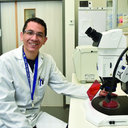A cheap, simple high throughput method for screening native Helicobacter pylori urease inhibitors using a recombinant Escherichia coli, its validation and demonstration of Pistacia atlantica methanolic extract effectivity and specificity.
Açar sözlər
Mücərrəd
Helicobacter pylori is the most frequent and persistent bacterial infection worldwide, and a risk factor for active gastritis, peptic ulcers, mucosa-associated lymphoid tissue lymphoma, and gastric cancer. Although combined antibiotics treatment is effective cases of antibiotic resistance are reported at an alarming rate. The H. pylori urease enzyme is essential for the bacteria establishment in the gastric mucosa, resulting urease inhibitors being sought after as effective and specific anti- H. pylori treatment. To-date, screening assays are based mostly on the analog plant urease enzyme but difference in properties of the plant and bacterial enzymes hamper these efforts. We have developed a screening assay based on recombinant Escherichia coli expressing native H. pylori urease, and validated this assay using thiourea and a methanolic extract of Pistacia atlantica. The assay demonstrated the thiourea and the extract to be potent urease inhibitors, with the extract having strong bacteriostatic activity against clinical isolates of H. pylori, including such with antibiotic resistance. The extract was also found to be neutral toward common probiotic bacteria, supporting its specificity and compatibility with digestive system desired microflora and suggesting it could be a good source for anti-H. pylori compounds. The assay has proven to be cheap, simple and native alternative to the plant enzyme based assay and could allow for high throughput screening for new urease inhibitors and could expedite screening and development of novel, better H. pylori remedies helping us to combat this infection.


